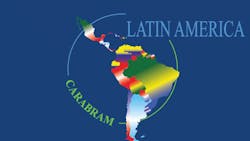With a $4.8 trillion economy, approximately 600 million citizens and a burgeoning middle class, Latin America is a rapidly-growing market.
And this market is receiving high level attention as evidenced by President Obama’s recent visit with Mexican President Pena Nieto. They jointly announced efforts to work towards turning the Americas into the biggest global economy. Vice President Biden also completed a six-day trip in the region, including Brazil and Colombia, and signed a free trade agreement in Colombia.
Although Asia has demonstrated steady growth and aggressive development of trade relations with Latin America in recent years, the United States continues to be Latin America’s most important commercial partner, exceeding more than $635 billion in trade in 2010 (four times more than with China).
Growth is the hallmark of this region as demonstrated by more than 50 million Latin Americans that have joined the middle class over the past decade. An expanding middle class with a well-educated workforce has created millions of new consumers for manufacturers.
Regional Opportunities
There is more to be expected from Mexico, a country which has set a political goal to grow at 6% per year, of from Chile, which will probably gain a ‘developed nation’ status in the next five years. Panama
There are some growth miracles like Panama, which doubled its GDP in the past decade and will probably grow 9% this year. Panama’s future prospects are bright. The International Monetary Fund sees new investment opportunities stemming from infrastructure development and the expanded Panama Canal, the recent approval of Free-Trade Agreements with the United States, the European Union, and Canada, as well as a large private mining project.
Peru is another rising star. Its GDP is expected to grow above 6% this year. Over the period 2002–12, the Peruvian economy almost doubled in size, and the average annual inflation rate fell to 2.8 %, the lowest in the region.
Beyond the growth in economies, a number of regional trade agreements – from NAFTA, to CAFTA-DR, to Mercosur, to the newly-forming Pacific Alliance - allow manufacturers to avoid tariffs and take advantage of economies of scale.
Flow of Capital
Investors have recognized these regional opportunities and while foreign direct investment (FDI) worldwide fell 18% in 2012, and plummeted 32% to 1990’s levels in developing economies, FDI to Latin America grew 7%.
According to Latin Business Chronicle, FDI increased 58.7% in Dominican Republic, 48.7% in Peru, 34% in El Salvador and 32.2% in Chile.
Looking at Mexico, recent investments by European and Japanese automakers have led some to dub it the “New Detroit.” Nissan will invest $2 billion on a plant in Aguascalientes to profit from what Jose Roman, the carmaker's CEO for Latin America, calls "Calidad Mexicana." Honda will invest $470 million on a plant to build transmissions in Celaya and Audi $1.3 billion on an assembly plant for their Q5 SUV's in San Jose Chiapa.
Financial Transactions in Manufacturing Sector
There is a surprising trend in financial transactions as large non- financial U.S.-based companies have lost relevance in the M&A market in Latin America. There have been important transactions like coatings manufacturer Sherwin-Williams acquisition of Mexican Comex in a $2 billion deal or General Mills buying of Brazilian food manufacturer Yoki for $900 million.
Non-U.S. companies are involved in M&A deals as well with the largest acquisition in 2012 carried occurring when InBev took full control of Mexican Modelo in a $20 billion deal.
Much smaller deals include Nestlé’s $130 million investment in their soluble coffee plant in Mexico which will turn it into the world’s largest. Even unexpected forays like Spanish Pascual, taking a 50% share in the Venezuelan Yogurt market.
Nevertheless, with few exceptions, the list of the top M&A deals in the manufacturing sector in 2012 were carried out by Latin American companies, jockeying to obtain a better standing in regional markets.
Governmental Issues for Investors
Latin America has become a friendly place for investments. The exceptions to the rule would be Argentina, Venezuela, Bolivia, Cuba and Ecuador. But all other nations, including Peru, a country headed by a left-wing government, have eased their restrictions on FDI, and in general promote these investments.
Latin American countries vary widely in their acceptance of U.S. investment and ease of setting up a business. By and large you will see more receptive countries lying on the Pacific coast (especially the Pacific Alliance countries: Mexico, Colombia, Peru, and Chile), Central America (especially Panama, Costa Rica, and Guatemala), and the Caribbean (especially the Dominican Republic). These countries have well-established institutions, good respect for the rule of law, and well-developed mechanisms for accepting foreign investment and establishing businesses.
The country’s Atlantic economies – especially Argentina and Brazil – are a little more suspect of U.S. enterprises and foreign investment. Argentina will pose a serious challenge to the foreign investor with severe restrictions on imports and foreign currency, while Brazil with its infamous “Brazil cost” with labyrinthine regulations and excessive bureaucracy is enough to give any investor a headache.
That is why many firms chose to partner with existing Brazilian companies to avoid the difficulties of a green-field startup. However Uruguay and Paraguay are an exception to this – Paraguay especially have become a cheap center of manufacturing to enter the Brazilian market.
Members of the Venezuela-led “Bolivarian Alliance” (especially Venezuela, Bolivia, and Ecuador) will also present some challenges. These countries – especially Venezuela – are famous for their nationalizations and challenges presented to the investor.
Rosemary Winters is CEO of Latin Trade Group.
